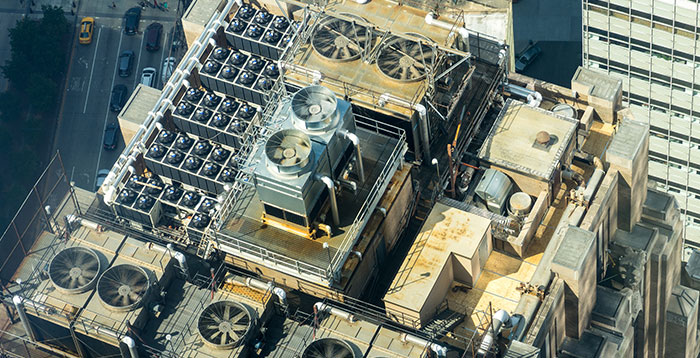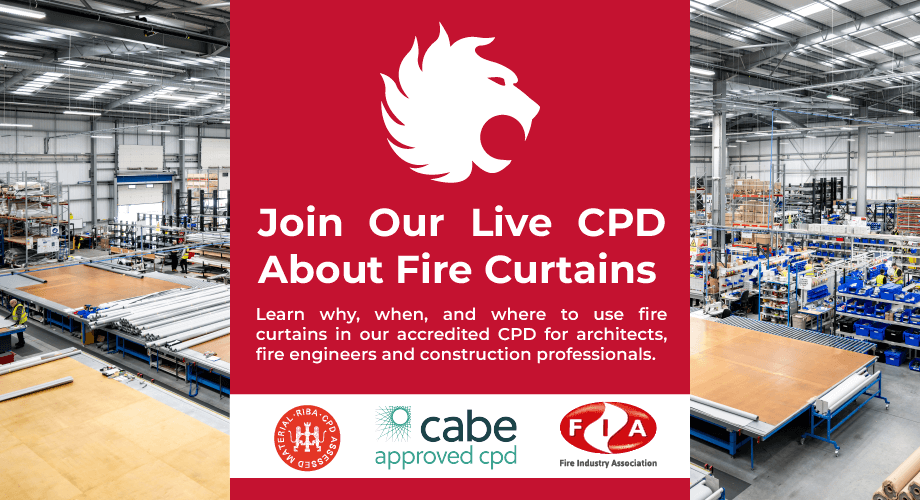Industries Most at Risk of Fire
Commercial Kitchens
Cooking equipment including deep fryers, ovens, grills, barbecues, rotisseries, portable warming equipment and grease hoods cause around 4,500 fires per year. That makes restaurants, pubs and cafes the most likely environments to catch fire.
Industrial Spaces
Factories and manufacturing plants have brought on some of the most detrimental fires in the UK, both in terms of property damage and loss of life.
The leading cause of industrial building fires is combustible dust – it ignites easily with little more than a spark. Sparks can be released into the air by electrical wiring, friction caused by moving heavy machinery, welding, torch cutting – or even just by accidentally dropping tools.
Mission-critical Environments
Airports, aircraft hangars, jet engine test facilities and refineries are high-risk environments due to their open floor spaces, high roof decks and the presence of flammable liquids.
Well aware of their exposure, mission-critical businesses facilitate clean agent suppression systems that work rapidly to contain and eliminate fires.
Office Buildings
As with other industries, cooking equipment is the leading cause of fire in many office buildings, causing nearly 1,000 emergencies per year. Fires spread in office spaces because of abundant combustible materials – like paper and furniture.
Commons Causes of Industrial Fires
Combustible Dust
Dust gets accumulated in every manufacturing unit – even ultra-clean food processing plants. Tiny explosive and flammable particles cause a chain reaction if ignited, causing the fire to spread quickly.
Hot Work
Welding, heating, burning, torch cutting, brazing and countless other industrial activities release heat and sparks. These sparks can ignite exposed combustible materials, resulting in fire.
Flammable Liquids And Gases
Flammable liquids and gases have the power to burn down entire premises when improperly contained. If exposed, some chemicals can ignite just by coming into contact with elements in the air.
Equipment And Machinery
Faulty, poorly installed or neglected equipment can cause sparks.
Electrical Hazards
Exposed wires, static discharge, overloaded outlets and loose fittings can lead to secondary fires.
Human Error
One of the most common causes of industrial fires is human error – someone might forget to clean their workstation, spill excess flammable liquid, or put the wrong material in a microwave.
Fire Prevention and Safety in Industrial Environments
There is no such thing as being over-prepared for an emergency. These are the most significant ways to protect staff from fire risks.
Fire Risk Assessment
All businesses must have a Fire Risk Assessment – it’s one of the first things a fire authority inspection officer will ask to see if they visit the premises. Any business with more than four employees must have the risk assessment in writing for easy reference.
You don’t need to use a professional risk assessor – anyone who can correctly identify potential fire hazards, people at risk and develop an action plan is suitable.
As a business grows, the fire safety plans, escape routes and prevention systems must be adapted accordingly and updated on the documentation. Every business must have designated ‘responsible person’ who manages the fire safety duties, including regular checks and risk assessment updates.
Fire Marshals
In every business, fire marshals or wardens must be appointed. If you’d like to think of yourself as a hero (or just want a pay rise if you rescue your boss), you should definitely consider becoming your department’s fire marshal!
As a fire marshal, you’ll be trained in using fire extinguishers, be responsible for making contact with the emergency services and assisting with evacuation.
Signage
You’ve probably mastered being out the door on a Friday in 10 seconds – but it’s not the same as escaping a fire. Flames, smoke, panic, fear – these can make getting out much more difficult.
Leaving your building in an emergency should be just as easy as your Friday evening clock-off. Illuminated walkways, signs and fire exits are some of the best tools to help people find their way out of a building in an emergency.
Fire Alarm
Fire alarms are a major component in fire protection, usually taken for granted – probably because of all those fire drills at school and work ingrained in us over the years.
That normalisation of fire alarms is actually a good thing; it helps keep you calm in a real fire.
Everyone must be able to hear the alarm clearly, with an alarm call point by every exit. It’s important to test alarms monthly and have them serviced at least every 6 months to ensure they are working effectively.
Fire Suppression Systems
UK fire safety legislation states that you must provide “appropriate fire-fighting equipment” for your premises. Higher-risk businesses like restaurants or laboratories may need hose reels and sprinklers.
The most common suppression systems are fire extinguishers – find out more about fire extinguishers and how they differ for various types of fire requirements. All equipment must undergo an annual maintenance test.
Emergency Lighting
Legislation stipulates that emergency lighting is required in the case of a power cut and recommended for rooms larger than 60 square metres.
- Escape route lighting: illuminates exit routes to help people find the nearest fire exit
- Panic lighting: formally known as ‘open area lighting’ to keep communal areas lit to reduce panic in the darkness
- High risk task area lighting: illuminates areas of potentially dangerous hazards e.g. where equipment needs to be shut down.
To ensure emergency lighting is effective, it should be tested monthly and be serviced once a year.
Fire Safety Training
Fire safety training is the most effective way to help people feel confident and fully prepared in case of an emergency.
Regular fire drills should reassure employees of where the fire exits, meeting points and fire extinguishers are located. Any adaptations to the building must be considered in refresher training.
Next Level Fire Safety
At Coopers Fire, we ensure our partners have the safest working environments possible. If your business needs fire protection, we are here to help. Talk to us on 02392 454 405 or email info@coopersfire.com.


